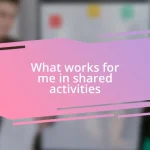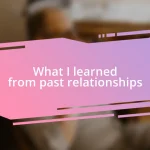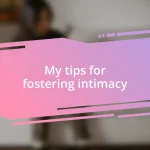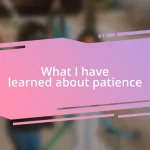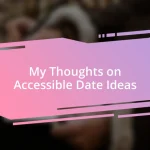Key takeaways:
- Group dates provide a sense of community and reduce pressure, fostering genuine connections among disabled singles.
- Choosing the right, accessible setting and engaging in shared activities can enhance interactions and create a welcoming environment.
- Effective communication, including consideration of different needs and encouraging quiet voices, is essential for a successful group outing.

Understanding group dates benefits
One of the most significant benefits of group dates for disabled singles is the opportunity to foster a sense of community. I remember attending a group outing where everyone shared a laugh over a shared experience; the atmosphere felt unguarded and warm. It made me realize how powerful connection can be when we’re together—there’s something reassuring about knowing others can relate to your challenges.
Group dates also reduce the pressure that often accompanies one-on-one interactions. I’ve found that being part of a larger gathering allows for a more relaxed vibe, which can be especially freeing. Isn’t it easier to engage when you’re not solely focused on impressing one person? This comfort can lead to more genuine interactions and a greater chance of finding connections that matter.
Moreover, group dates open the door to diverse connections, broadening social circles in unexpected ways. I once met someone in a group setting who I wouldn’t have approached one-on-one, yet we clicked instantly. Isn’t it fascinating how different dynamics can spark connections that might have stayed hidden otherwise? The variety of interactions in a group often leads to discoveries about ourselves and others that pave the way for meaningful relationships.
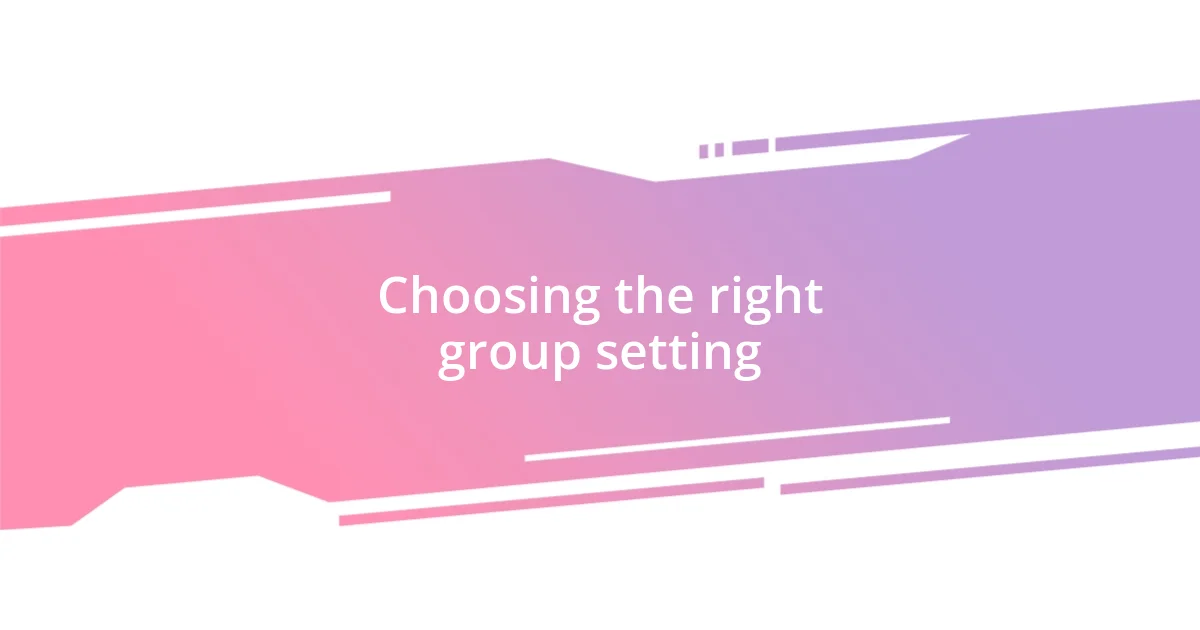
Choosing the right group setting
Choosing the right group setting can truly enhance the experience for disabled singles. When I think about my own encounters, I often prioritize spaces that offer accessibility and comfort. For instance, an outdoor picnic or a casual cafe setting encourages a relaxed environment where conversations flow seamlessly, making it easier for everyone to engage without feeling restricted.
It’s essential to consider the interests of the group when selecting a setting. I remember organizing a game night at a local community center, where everyone brought their favorite board games. The atmosphere was not only inclusive but filled with excitement as people connected over shared interests. It was a perfect reminder of how the right setting can cultivate interaction and spark joy.
Moreover, the group size plays a crucial role. Smaller gatherings tend to foster intimacy, allowing deeper conversations to blossom. I once attended a group hike with just five others, and it felt more personal. We shared stories, laughter, and even a few challenges along the trail, creating bonds that lingered long after the hike. So, when choosing your group setting, think about what kind of connections you want to nurture – whether casual or more intimate.
| Setting Type | Advantages |
|---|---|
| Outdoor Picnic | Relaxed atmosphere; connects through nature |
| Community Center Events | Inclusive; offers structured activities |
| Cafes/Informal Gatherings | Casual vibe; encourages easy conversation |
| Smaller Groups | More intimate; deeper conversations |
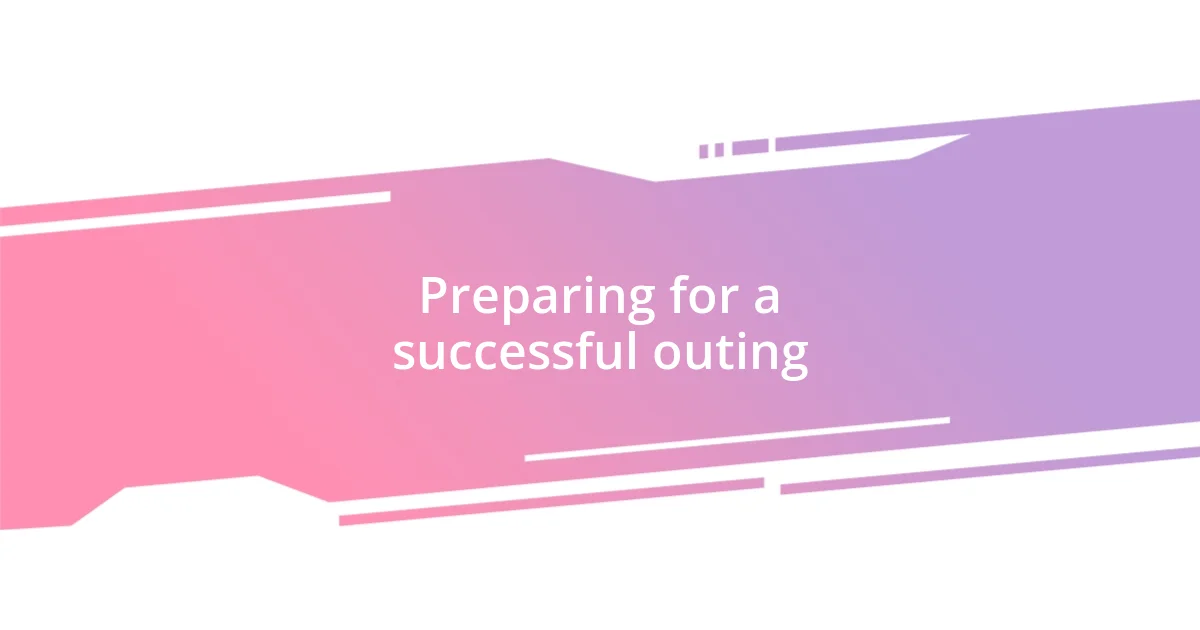
Preparing for a successful outing
Preparing for a successful outing is about more than just showing up; it’s about setting the stage for authentic connections. In my experience, taking a moment to clarify what you hope to achieve can truly make a difference. For instance, on a recent group date, I shared my love for photography, and it opened the door to others who were also passionate about visual arts. That shared interest sparked conversations that went well beyond small talk—it was exhilarating!
Here’s a quick checklist to help prepare for a group outing:
- Communicate Your Interests: Let everyone know what hobbies or topics excite you; it could spark meaningful connections.
- Be Open and Approachable: Smile and engage with newcomers; warmth can make all the difference.
- Bring Something Fun: A shared activity, like a game or a hobby item, can serve as a great conversation starter.
- Set Personal Goals: Think about what you want to achieve during the outing—making a new friend or trying a new experience.
- Consider Your Comfort: Make arrangements that cater to your needs, ensuring you feel at ease throughout the event.
Planning ahead always enhances the experience, so I encourage everyone to embrace this process—it can truly be rewarding!
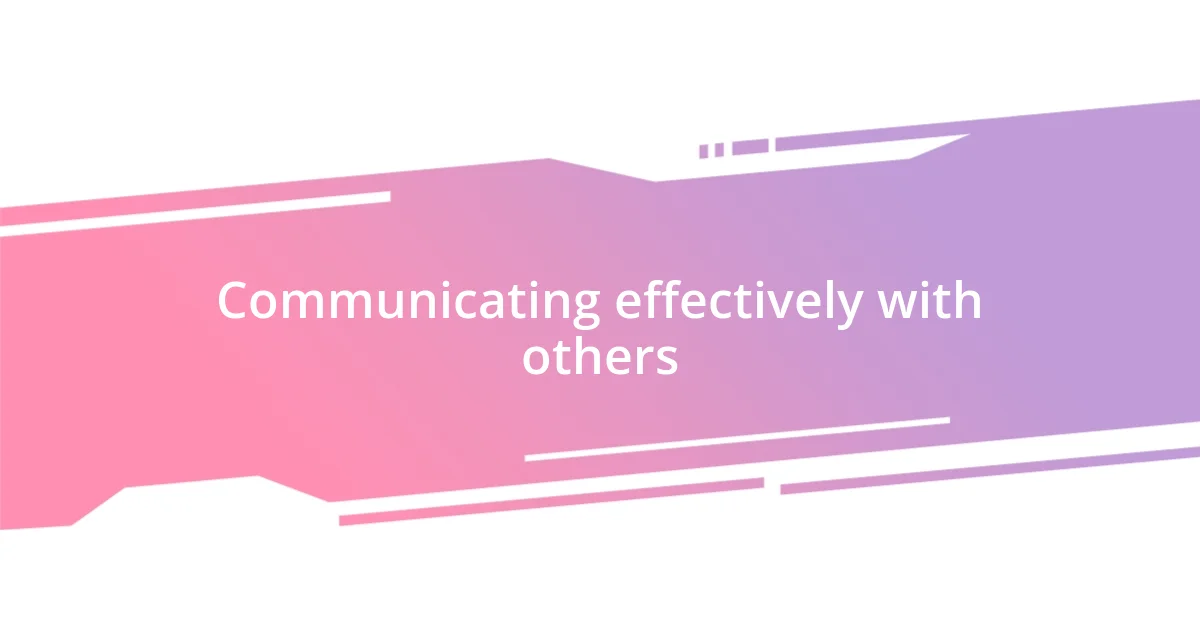
Communicating effectively with others
Communicating effectively with others is all about creating a connection that resonates on a personal level. I recall a group outing where we discussed our experiences with different hobbies. The moment I shared my struggles with finding the right photography gear, it sparked a deeper conversation with someone who had been through similar challenges. This exchange not only fostered empathy but also built trust, allowing us to connect in a way that felt genuine and supportive.
It’s amazing how small gestures can facilitate communication. I often find that maintaining eye contact and offering a warm smile can break down barriers, especially in a group setting. During one particular event, I noticed that as I engaged with others attentively, they began to open up about their stories. Could it be that the simple act of listening invites people to share more? I believe so, and I’ve seen it happen time and again.
Embracing non-verbal cues is another essential aspect of effective communication. For instance, when someone uses sign language, I do my best to follow along and respond, even if it’s just with a nod or an encouraging expression. It shows that I’m engaged and respectful of their communication style. I once attended a group discussion where someone used a communication device, and I admired how effortlessly they included everyone in the conversation by directing their attention with eye contact. It was a beautiful reminder of how the nuances of communication can create inclusive environments where everyone feels valued.
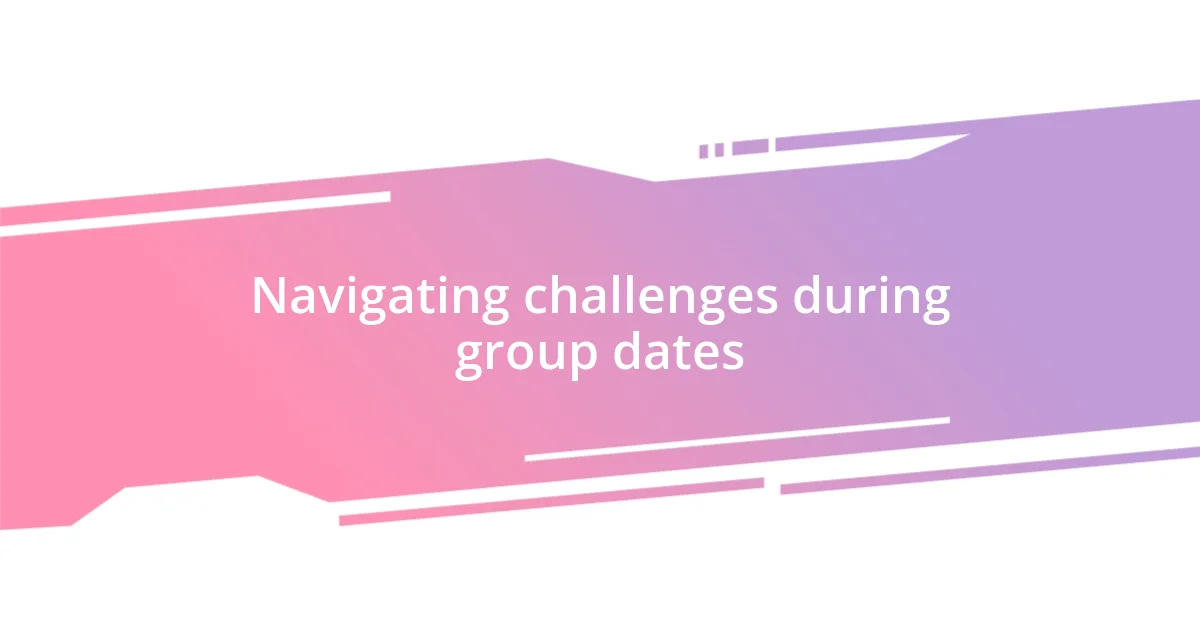
Navigating challenges during group dates
Navigating challenges during group dates can sometimes feel overwhelming, especially for disabled singles. I remember one time during a group outing when a participant felt lost among the crowd due to mobility challenges. It struck me how important it was for the group to be mindful of varying needs. We ended up discussing the layout of the venue, and that simple act of consideration created a comfortable space for everyone. Have you ever wondered how awareness can radically transform a shared experience? It’s astounding how small adjustments can make a world of difference.
Another challenge involves keeping the conversation flowing, particularly when someone might feel shy or hesitant to speak up. I once observed a fellow group member struggle to find their voice during a discussion. Taking a moment to check in with them—not in a pushy way, but with genuine interest—led to a beautiful exchange. It’s these moments that remind me of the importance of inclusivity in our dialogues. How often do we consciously think about drawing in quieter voices? I believe that engaging everyone creates a more vibrant and enjoyable atmosphere.
I also think about how group dynamics sometimes shift unexpectedly. During a fun outing, I noticed that a few participants began dominating the conversation, unintentionally sidelining others. In that moment, I took it upon myself to gently redirect the focus by inviting quieter individuals to share their thoughts. It’s a delicate dance, isn’t it? Balancing the flow of conversation while ensuring everyone feels heard is crucial. I’ve found that being aware of the moment and addressing it can enhance the group experience, allowing connections to flourish.
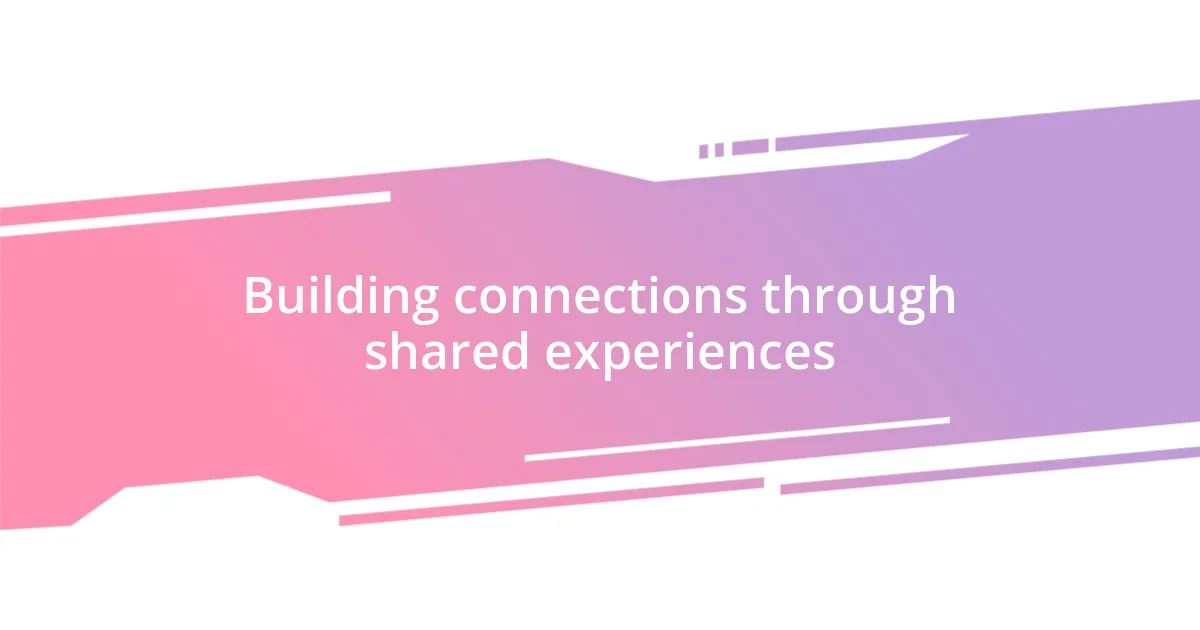
Building connections through shared experiences
Building connections through shared experiences comes to life in group settings, especially for disabled singles. I vividly recall an art workshop where everyone was encouraged to express their thoughts through creativity. While painting alongside others, I overheard someone share a touching story about their love for the arts. That moment sparked a chain reaction of laughter and storytelling, revealing not just shared hobbies, but deeper life lessons. Isn’t it fascinating how a single shared activity can open the door to so many personal narratives?
It’s truly heartwarming to witness individuals bond over common experiences. During a cooking class, there was a participant who hesitated to join in, worried about how their mobility aids might affect their participation. But as we all pitched in, I noticed their face light up when they shared a family recipe. That simple act of sharing created a sense of belonging. I couldn’t help but think, don’t we all crave those moments where we can feel we belong and connect over what truly matters?
In my experience, discussing challenges can also draw people closer. I remember being part of a support group where we dove into our experiences with dating as disabled individuals. Initially, the atmosphere felt tense, but the moment one participant shared their own hurdles, others began to chime in. It was as if a weight had been lifted. I often wonder, how can vulnerability bring us together in unexpected ways? It seems that when we’re honest and open about our struggles, connections deepen, transforming a simple gathering into a safe space for growth and understanding.

